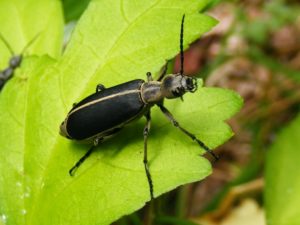Blister Beetle
 Quick Stats
Quick Stats
- Latin Name: Meloidae
- Size: Measuring 1-2.5 cm in length
- Color: Various colors ranging from ash gray to black to bright yellow with stripes
- Shape: Oval-shaped with a soft body
- Found in: Most common in southern states and around areas where livestock is found. Kentucky, Tennessee, and Mississippi all have several species of Blister Beetles
- Overview: Blister beetles release a caustic chemical when crushed that can burn human skin. They spend their days inside flowers and are often attracted to lights at night
About Blister Beetles
Blister beetles have long been known for the caustic chemical they release from their joints when crushed, known as cantharidin. While poisonous, cantharidin has been used for decades as a crucial component in “Spanish Fly,” a purported aphrodisiac. People also used it as a treatment for gout, arthritis and other ailments until the poisonous qualities because known by science. Blister Beetles are no longer widely used in western medicine for pharmaceutical purposes.
On the plus side, Blister beetles don’t typically infest homes. They’re not a real threat to humans but they can be quite dangerous to livestock. When settling inside bales of hay and feed, Blister beetles that become crushed can release toxic poison, sickening or killing the animals that eat it. Horses and cows are most susceptible to these issues.
Preventing Blister Beetles
Because Blister Beetles feed on plants and plant sugars they’re easily spotted on flowers, grasses, and on leaves. Adults lay eggs in protected places such as under rocks then once grown the larvae then leave the nest in search of food. The first sign of a Blister beetle infestation is usually spotting the pests in the daylight while they’re feeding. Because their bite leaves a red, blistering welt on the skin you’ll likely notice if you’ve been bitten. Livestock should be monitored carefully for Blister beetle bites and signs of poisoning which could include diarrhea, vomiting, or bloody urine.
If you suspect you may have a Blister Beetle problem you should contact a pest professional immediately. Because of their poisonous affects, these pests are more than just a nuisance – they can actually be harmful to your health or that of your animals. A quality pest prevention inspection will help determine whether you’ve got a Blister Beetle issue and from there you’ll work to come up with a plan for eradication.

